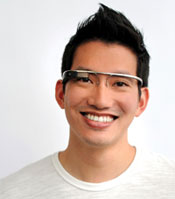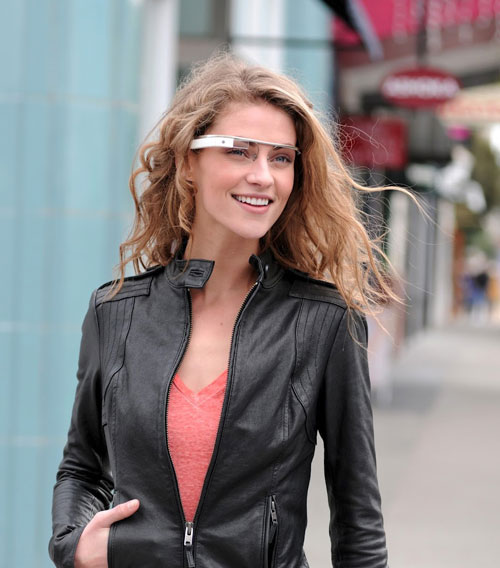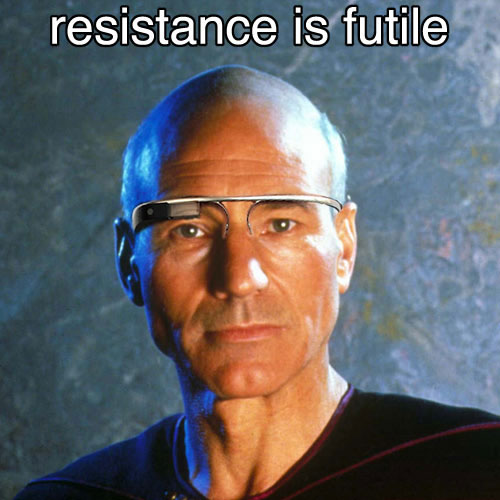Google’s Geeky Camera Glasses Could Be the Imaging Industry’s Latest “Spork”
posted Friday, July 6, 2012 at 11:33 AM EST
 The other day a couple of skydivers jumped out of a low flying aircraft and photographed the city of San Francisco as they glided down to land on the Morscone Center. Had they been ordinary parachutists under the heightened security after 9/11, they would have been plucked out of the sky or shot down, by Air Force jets long before they could exit their aircraft.
The other day a couple of skydivers jumped out of a low flying aircraft and photographed the city of San Francisco as they glided down to land on the Morscone Center. Had they been ordinary parachutists under the heightened security after 9/11, they would have been plucked out of the sky or shot down, by Air Force jets long before they could exit their aircraft.
But these were not ordinary mortals. They were Googlers and that made all the difference. In a bit of showboating, Google’s co-founder Sergey Brin moderated the images sent by the Google Glasses (aka Google's Project Glass) the jumpers wore on their descent. The live video demonstrated both the Google Glasses and the corporate power of Google.
Technologically advanced far beyond the simple $29.95 Camera Sunglasses with MP3 that I reviewed recently and the very long awaited Lady Gaga fashion camera sunglasses, the Google Glasses were introduced to a breathless crowd as the next best thing since sliced bread. The Moscone audience roared its approval with many software developers signed up to pay $1500 each for a beta model that they could develop software for.
However, my own experience with the Camera Sunglasses makes me skeptical about the Glasses, a sentiment echoed by The Week, an online business journal, in its headline, “Will normal people really wear computerized specs?”
As the old saying goes: “Well, that depends on what you mean by normal.”
The Week went on to note that, “Google is betting big on Google Glass, which will reportedly allow a wearer to use vocal commands to send instant messages, look up directions, snap photos, and video chat with friends. The search giant seems intent on shaping a whole new product category from which it can immediately emerge as a market leader.”
I think The Week has identified the concern, expressed by others too, that Google may be going in circles and I do not mean Google+ circles.
What they questioned -- and I agree with -- is what in the world is the fascination of camera eyeglasses? Growing up as a vision challenged child who wore glasses since the age of 12, I remember the taunts of, “hello, four eyes” and “girls don’t make passes at boys who wear glasses.”

Last thing I would want to do is voluntary wear glasses. Everyone does wear sunglasses, so a camera in them isn’t quite as off putting. The Google Glasses are not sunglasses. They are geeky looking nerd glasses.
My use of the camera sunglasses left me with mild neck strain and a headache, which points up other problems that Google's Project Glass will face despite their Android technology.
While Mr. Brin’s video was an exercise in jiggle-cam-ery, the bouncing image was acceptable, considering that the skydivers were tumbling earthward. However, normal life it doesn’t work that way.
As a photographer, I found that framing images and videos was a major handicap of the Camera Sunglasses. Learning to frame by pointing one’s nose in the general direction of the subject is not a very good solution. The Project Glass device has a glass screen, like an EVF, on the right eyeglass arm that shows the wearer text messages and emails. For photographers, I think is the real technological breakthrough. Could this Glass technology finally bring us optical viewfinders with data display?
However, using the Glasses will take multitasking to a new level, as wearers will have to walk, talk, and chew gum while attending to text and images on the Glasses screen. Like many other groundbreaking inventions -- remember the spork, that mutant mash up of a spoon and fork? -- the Glasses may be simply something most people will never want to use. After all, who wants to be looking into someone's eyes over dinner and realize that they are watching a YouTube video?
Solving the problems of muscle strain then lets us focus on the social strain of wearing a device like Google Glass. The Week quotes Sam Biddle at Gizmodo who says that having a computer "that's literally sitting on our face for every waking moment sounds really socially alienating."
Adding that technology "should make the way we live our lives better, not dictate the way we live. But are they impressive things that anyone actually wants?"
Google’s responds by saying that, “The headset's display sits off to the side of your eye so that you can interact with it only when you need to. When an email or text message comes in, you can look if you want, or simply ignore it. The frames are barely there, and that's exactly the point. Glass will free us from having to peer down at a 4-inch smartphone screen, allowing us to be even more social than we are now."
Then Google adds, that "We will no longer have to constantly look at our devices, but instead, these wearable devices will look back at us."
There was something familiar about the Google logic and the Project Glass glasses themselves. Despite posing the glasses on some very pretty Google staff there was something eerily familiar about the whole thing. After a little while, I remembered what it was.
“We are the Borg. Resistance is futile.”
